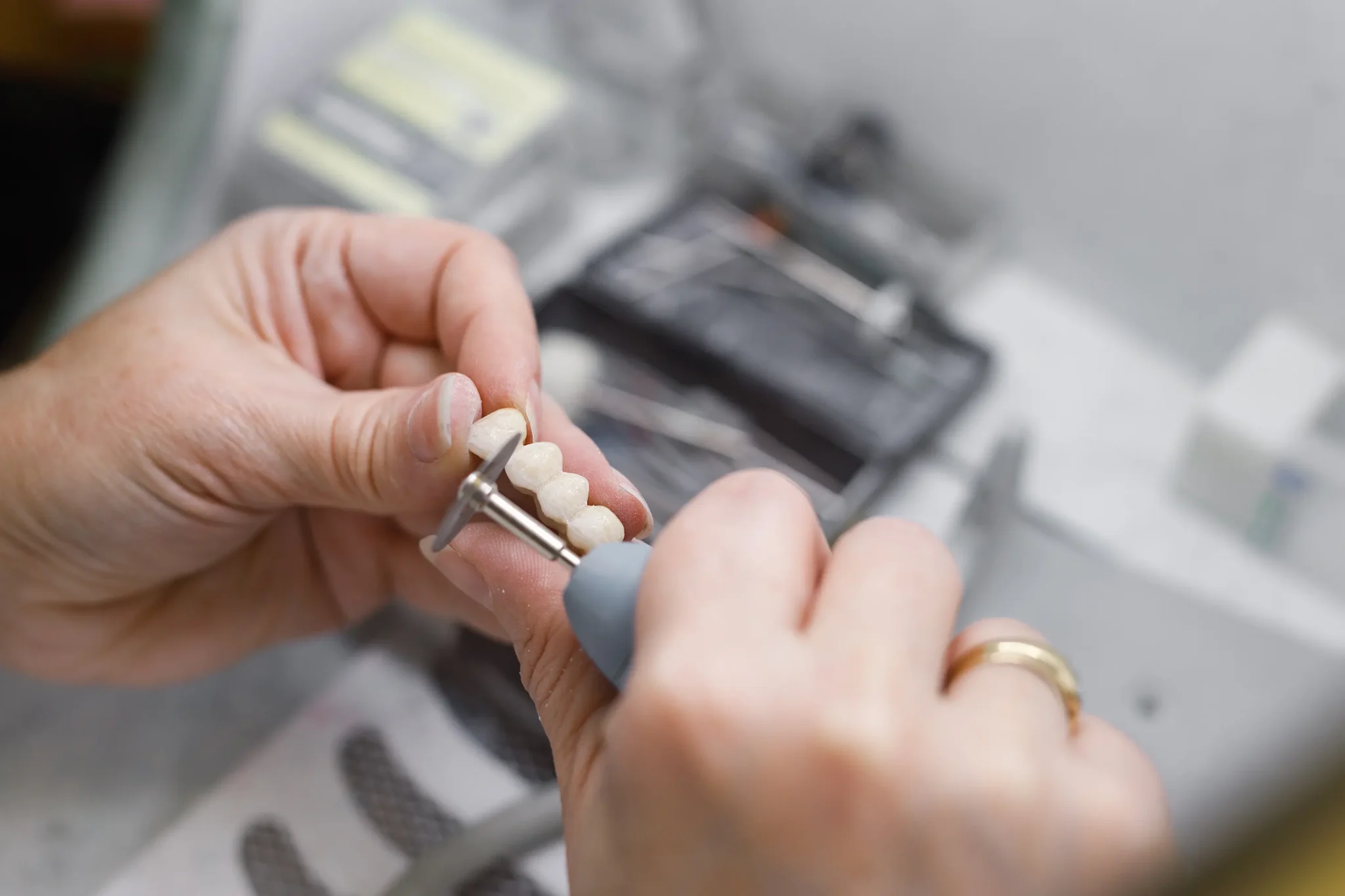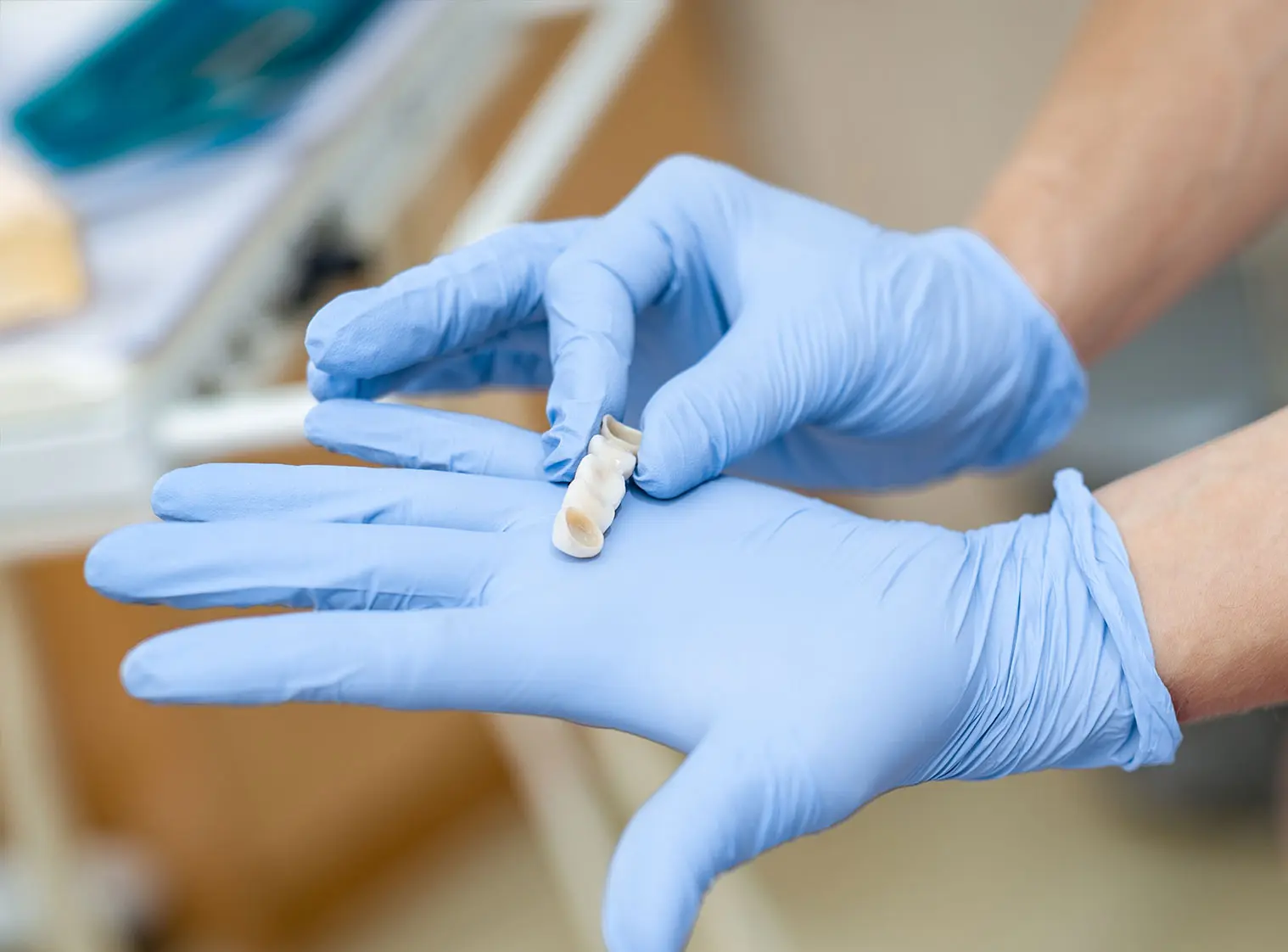Traditional Bridge
The most common option, a traditional dental bridge features one or more artificial teeth supported by dental crowns on adjacent natural teeth.
Tooth loss can significantly impact both your smile’s appearance and functionality. Thankfully, dental bridges offer an effective solution for replacing missing teeth. Don’t let gaps in your smile compromise your oral health — restore your missing tooth or teeth at Precision Dentistry & Implants of Kerrville.
Learn more about dental bridges and how they can replace missing teeth in your smile. Reach out to Dr. Matthew Huff, our experienced dentist in Kerrville, TX, by calling (830) 896-8343. We’ll promptly schedule your consultation to help you regain your confident smile and optimal oral health.

Dental bridges are custom-made prosthetic devices designed to replace one or more missing teeth. These artificial tooth restorations consist of artificial teeth anchored by surrounding natural teeth or dental implants. Bridges can be crafted from various materials, including porcelain, ceramic, or metal alloys, to ensure both durability and aesthetic appeal.
We offer several types of dental bridges to suit your unique needs:
The most common option, a traditional dental bridge features one or more artificial teeth supported by dental crowns on adjacent natural teeth.
A cantilever dental bridge is ideal when only one adjacent tooth is available for support.
A conservative option, a Maryland dental bridge uses a metal or porcelain framework bonded to the back of supporting teeth, often used for front tooth replacement.
Anchored by dental implants, an implant-supported bridge offers superior stability and longevity.

Opting for a dental bridge can provide numerous benefits, including:
To explore how dental bridges can transform your smile, contact Dr. Huff at Precision Dentistry & Implants of Kerrville by calling (830) 896-8343 today.
The dental bridge procedure typically involves:
The dental bridge process begins by preparing the teeth on either side of the gap (abutment teeth) to support the bridge. This involves reshaping the teeth and taking impressions for the dental lab to create the dental bridge.
A temporary dental bridge is then placed to protect the prepared teeth while the permanent bridge is being fabricated.
Once the permanent dental bridge is ready, it is carefully fitted and cemented into place, restoring the smile’s appearance and function.
After receiving your dental bridge, maintaining proper oral hygiene and attending regular check-ups will ensure the dental bridge’s longevity as well as your overall oral health.

While the cost of your dental bridge will vary based on individual factors, you can generally expect to invest between $2,500 and $6,000. Factors influencing the total cost of dental bridges include:
Determining if a dental bridge is the right solution for you depends on several important factors. During your comprehensive consultation, Dr. Matthew Huff will carefully evaluate the following aspects to ensure the best treatment plan for your unique situation:
Ideal candidates have missing teeth with healthy adjacent teeth on both sides to support the dental bridge. The position of the gap in your smile plays a crucial role in determining the most suitable type of bridge.
The supporting teeth, known as abutment teeth, must be strong and healthy enough to anchor the dental bridge. Dr. Huff will assess these teeth for decay, structural integrity, and root health to ensure they can provide adequate support.
Traditional dental bridges typically replace one to three consecutive missing teeth. If you have multiple gaps or non-adjacent missing teeth, Dr. Huff may recommend alternative solutions or a combination of treatments.
Maintaining excellent oral hygiene is crucial for the longevity of your dental bridge. Dr. Huff will evaluate your current oral care routine and provide guidance on proper cleaning techniques for your new restoration.
Healthy gums are essential for supporting a dental bridge. If you have signs of gum disease, Dr. Huff may recommend addressing this issue before proceeding with bridge placement.
Your overall bite pattern affects the success of a dental bridge. Dr. Huff will examine your occlusion (how your teeth come together) to ensure the bridge will function properly and not cause undue stress on other teeth.
If you’ve been missing teeth for an extended period, you may have experienced some bone loss in the jaw. Dr. Huff will assess the bone density and volume to determine if additional procedures, such as bone grafting, may be necessary before bridge placement.
Your general oral health, including any existing dental work, will be evaluated to ensure a dental bridge is the most appropriate solution for your needs.
Certain habits, such as smoking or grinding your teeth, can impact the success of a dental bridge. Dr. Huff will discuss these factors with you and recommend appropriate measures to protect your new restoration. If a dental bridge isn’t the ideal solution for you, Dr. Huff may recommend alternative treatments such as dental implants or partial dentures.
Dental bridges typically last between seven to 20 years, depending on the type of bridge, materials used, oral hygiene practices, and regular dental care. Implant-supported bridges often have the longest lifespan among all options.
Unlike natural teeth, dental bridges cannot be whitened using traditional teeth-whitening methods. That’s why it’s crucial to select an appropriate shade when initially getting your bridge. If staining occurs, professional cleaning or, in some cases, replacement may be necessary to restore its original appearance.

Ready to close the gaps in your smile? Don’t delay any longer! Contact Dr. Huff at Precision Dentistry & Implants of Kerrville by calling (830) 896-8343 to schedule your dental bridge consultation. Dental bridges can restore your smile’s beauty and functionality, helping you regain your confidence.
We’re excited to help you achieve optimal oral health and a radiant smile! Precision Dentistry & Implants of Kerrville proudly provides dental bridges and other restorative services to patients from Kerrville and surrounding areas such as Center Point, Fredericksburg, and Ingram, TX.
"*" indicates required fields

Dr. Huff only uses the best when it comes to in-office technology at Precision Dentistry & Implants. We value your comfort and your time above all else. New advances in dental technology allow us to treat you with expert precision in a comfortable and timely manner.